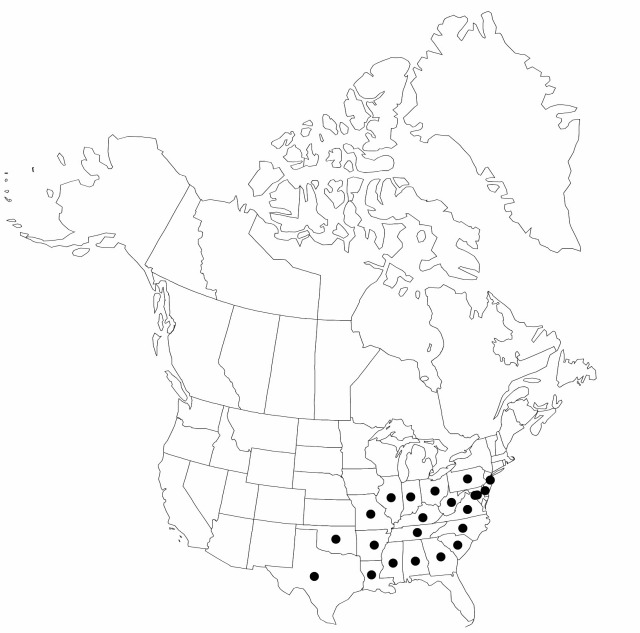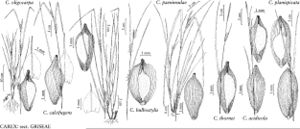Difference between revisions of "Carex planispicata"
J. Kentucky Acad. Sci. 60: 37, fig. 1. 1999.
FNA>Volume Importer |
imported>Volume Importer |
||
| Line 6: | Line 6: | ||
|place=60: 37, fig. 1. 1999 | |place=60: 37, fig. 1. 1999 | ||
|year=1999 | |year=1999 | ||
| + | }} | ||
| + | |special_status={{Treatment/ID/Special_status | ||
| + | |code=F | ||
| + | |label=Illustrated | ||
| + | }}{{Treatment/ID/Special_status | ||
| + | |code=E | ||
| + | |label=Endemic | ||
}} | }} | ||
|basionyms= | |basionyms= | ||
| Line 50: | Line 57: | ||
|publication title=J. Kentucky Acad. Sci. | |publication title=J. Kentucky Acad. Sci. | ||
|publication year=1999 | |publication year=1999 | ||
| − | |special status= | + | |special status=Illustrated;Endemic |
| − | |source xml=https:// | + | |source xml=https://bibilujan@bitbucket.org/aafc-mbb/fna-data-curation.git/src/bb6b7e3a7de7d3b7888a1ad48c7fd8f5c722d8d6/coarse_grained_fna_xml/V23/V23_839.xml |
|genus=Carex | |genus=Carex | ||
|section=Carex sect. Griseae | |section=Carex sect. Griseae | ||
Revision as of 21:38, 27 May 2020
Plants densely cespitose; rhizome internodes 0.2–6(–8) mm, 1.6–2.2 mm thick. Culms strongly purple-red to (3.4–)5.5–9.6 cm high at base, 14–60 cm. Leaves: sheaths glabrous; blades green, widest blades (3–)3.5–6.5 mm wide, smooth abaxially. Inflorescences 0.55–0.96 of culm height; peduncles of lateral spikes barely scaberulous or smooth; peduncles of terminal spike 2.4–49 mm, barely to much exceeding lateral spikes; proximal bract sheaths tight, abaxially glabrous, sheath front truncate or slightly convex, elongated to 3.1(–4.8) mm beyond apex; ligules 0.7–3.8(–13.4) mm; blades uniformly green, distal bract usually much exceeding terminal spike. Spikes 3–6, widely separate or distal 2–3 overlapping; lateral spikes pistillate, with (2–)5–14 perigynia, (4–)9–24 × (1.6–)2.9–6.4(–6.9) mm, ratio of spike length (in mm) to flower number = 1.5–2.3; terminal spikes (6–)14–26(–30) × (0.8–)1.3–2.5(–3) mm. Pistillate scales 2.8–4.5 × (1.2–)1.7–2.2 mm, margins whitish or tinged pale red-brown, entire, apex with awn 0.3–2.5 mm. Staminate scales 3.3–4.9 × 1.1–1.7 mm. Anthers 2.2–3.2 mm. Perigynia distichously imbricate, 57–69-veined, unwrinkled, oblong or elliptic to narrowly oblong or narrowly elliptic, obtusely triangular in cross section, (3.9–)4.2–4.9(–5.1) × (1.4–)1.6–1.8 mm, (2.4–)2.5–3.3 times as long as wide, dull, base very gradually tapered, apex gradually tapered; beak absent or straight, 0–0.3 mm. Achenes obovoid, 2.8–3.7 × 1.3–1.7 mm, tightly enveloped by perigynia; stipe straight; beak straight, (0.3–)0.4–0.7 mm.
Phenology: Fruiting spring–early summer.
Habitat: Mesic deciduous forests, usually in loams on lower portions of slopes adjacent to streams and on the upper portions of flood plains
Elevation: 10–800 m
Distribution

Ala., Ark., Del., D.C., Ga., Ill., Ind., Ky., La., Md., Miss., Mo., N.J., N.C., Ohio, Okla., Pa., S.C., Tenn., Tex., Va., W.Va.
Discussion
Carex planispicata is frequent. Often, it grows with C. abscondita, C. amphibola, and C. oligocarpa. When C. oligocarpa and C. planispicata co-occur, C. planispicata usually grows lower on slopes than C. oligocarpa, though the two do occasionally grow intermingled.
Until its description, Carex planispicata was long treated as C. amphibola or C. amphibola var. rigida (R. F. C. Naczi 1999).
Selected References
None.
